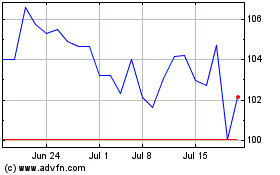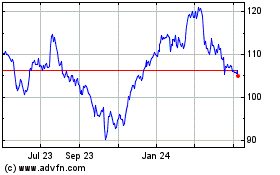By Ira Iosebashvili
A rally in stocks has triggered unusual circumstances for some
of Wall Street's biggest investors -- they are holding many of the
same companies.
A list of the market's most crowded trades includes Mastercard
Inc., Microsoft Corp., Amazon.com Inc., Abbott Laboratories and
PayPal Holdings Inc., according to analysts at Bernstein, who
tracked institutional ownership, price momentum, earnings forecasts
and valuations.
The overlap in the top 50 stocks holdings between mutual funds
and hedge funds -- two types of investors whose styles typically
differ -- now stands at near-record levels, a study by Bank of
America Merrill Lynch found.
Investors are drawn to stocks that have performed well and risen
fast. Shares that notched the fastest gains last year are valued
nearly 25% higher than normally relative to their next 12 months of
earnings, Bank of America's study showed. Big movers include
Chipotle Mexican Grill Inc., Starbucks Corp. and VeriSign Inc.
Some consequences of the trend were on display last week, after
earnings surprises from Amazon, Ford Motor Co., Tesla Inc. and
Google's parent Alphabet Inc. sparked outsize moves in their share
prices. Tesla and Ford, two stocks that have trended higher in
recent months, declined sharply when those companies reported
disappointing results. Meanwhile, Google's stock soared after the
company reported that revenues rose 19% over the same period last
year.
Big surges, like Google's 9.6% gain on Friday, can make those
companies even more appealing to trend-following investors, further
concentrating them in a relatively small group of stocks, analysts
said.
At the same time, few are willing to risk going against the
crowd. Stocks that are comparatively cheap have attracted little
interest, according to BofAML's research. Short interest on what is
known as FAANG stocks -- Facebook Inc., Apple Inc., Amazon, Netflix
Inc. and Alphabet -- is at historic lows, the bank said.
"This huge world of investible assets has shrunk down to a small
cohort, " said Savita Subramanian, equity and quantitative
strategist at Bank of America Merrill Lynch. "We're all in this
echo chamber where everyone goes to the same dinners and drinks the
same Kool-Aid."
This week investors are awaiting a spate of key economic
reports, including data on consumer spending, manufacturing and
Friday's nonfarm-payroll report, which investors will be gleaning
for information on how the U.S. economy fared in July.
While most believe the Federal Reserve will deliver a 25
basis-point rate cut at its meeting on Wednesday, strong economic
data could challenge projections for how much the central bank will
ease monetary policy during the rest of the year, a potential
obstacle for the market's rally.
As earnings season rolls on, investors will also get a look at
results from a range of companies, including Apple and Mastercard.
These two companies are among those that have provided money
managers safety in numbers.
Years of tepid expansion have also made investors hesitant to
broaden their holdings outside of the companies delivering
eye-catching results. That caution has been exacerbated in recent
months, as slowing growth around the world sparked fears of a
looming recession, widening the valuation gap between growth and
value stocks to record levels, data from DWS Group showed.
Yet some investors worry that the concentration of money in a
short list of stocks could exacerbate market declines if bad news
sparks a rush to the exits. Some of the same large tech stocks led
a May selloff that pulled the Nasdaq Composite into correction
territory with a more than 10% decline from its highs, a steeper
drop than the ones that hit the Dow Jones Industrial Average and
S&P 500.
Contrarian and value-oriented strategies have waned in
popularity in recent years as investors struggle to outperform
market-tracking funds. Disagreement among analysts about a
company's earning prospects can also make shares comparatively
unpopular.
Kent Engelke, managing director at Capitol Securities
Management, has avoided those big tech stocks over the last three
years, concentrating instead on finding stocks that are undervalued
relative to the rest of the market. Lately, that has led him to
invest in unglamorous areas like consumer nondurables and the oil
sector.
"I'm miserable," he said. "The last three years have been among
the most difficult ever out of 33 in the industry because we
haven't owned FAANG."
He plans on sticking to his guns, however, convinced that the
rally can fall apart if the Fed eases monetary policy less than
expected or if companies' balance sheets worsen.
That could result in "a really big, ugly selloff," he said.
So far, few investors seem inclined to change their approach,
although many are now increasing their positions in assets that
would take the edge off a potential hit to their portfolios. Prices
for gold, a popular destination for nervous investors, are near
their highest level in six years, while the Swiss franc stands at a
two-year high against the euro.
Analysts at UBS Global Wealth Management said that markets may
be overestimating how far the Fed will cut rates and that trade
tensions between the U.S. and China could weigh on growth. They
have balanced their position in U.S. stocks, which is overweight
relative to their benchmark, with positions in havens like
long-maturity Treasurys and the Japanese yen.
"We don't think the alarms should be ignored," Mark Haefele,
chief investment officer at UBS Global Wealth Management, said in a
note to clients. "But we also think the long-term opportunity cost
of aborting is likely to be too high."
Write to Ira Iosebashvili at ira.iosebashvili@wsj.com
(END) Dow Jones Newswires
July 28, 2019 05:44 ET (09:44 GMT)
Copyright (c) 2019 Dow Jones & Company, Inc.
Abbott Laboratories (NYSE:ABT)
Historical Stock Chart
From Mar 2024 to Apr 2024

Abbott Laboratories (NYSE:ABT)
Historical Stock Chart
From Apr 2023 to Apr 2024
